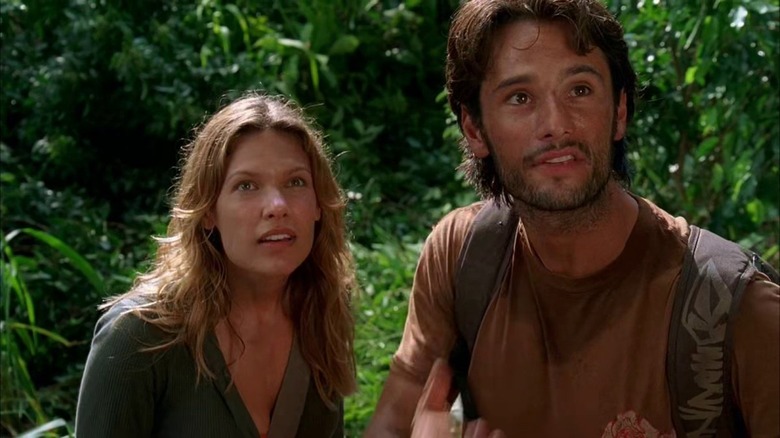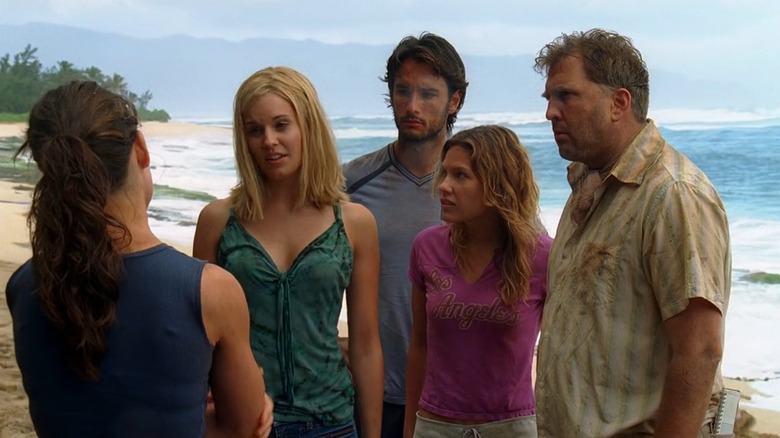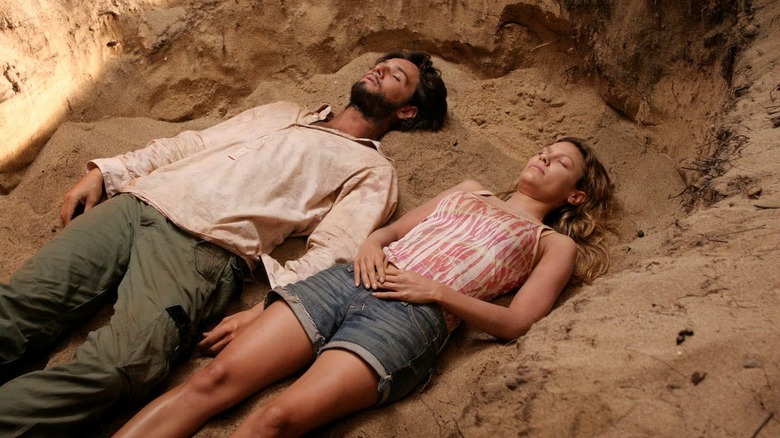Lost's Most Controversial Episode Feels Like A Time Capsule For A Bygone Era
The entirety of the hit ABC drama series "Lost" just dropped on Netflix (while also being available on Disney+ and Hulu, and on Disney+ outside the U.S.), meaning a whole new generation and a whole new audience will get to experience one of the best and most influential shows of the past 20 years through the most popular streaming service on the planet.
These new audiences will be introduced to the highs (like the best music score in TV history) and lows of this drama about castaways having to survive on a mysterious island, and they'll do so years removed from the heated conversations that made this a controversial and incredibly popular show. TV is very different today than it was when this show premiered 20 years ago, in no small part thanks to "Lost" itself. Serialization and expansive mythologies may be commonplace now, but mystery boxes with dozens of ongoing plots providing fuel for dozens of Reddit threads full of speculation weren't the norm back then. Plus, we are so far removed from the show's ending that the idea that "Lost" has a bad ending only helps someone coming in with fresh eyes as they're likely to be expecting something truly awful from the finale episode, rather than a poignant and beautiful episode and a perfect send-off.
This separation between the original airdate of the episodes — when people watched them week to week as anticipation and theories ran wild — and now, when you can just binge the show in a week (arguably the better way to experience it), means new audiences can actually appreciate what is possibly the most underrated episode of the entire show. I'm talking about season 3, episode 14 — "Exposé," also known as the one about Nikki and Paulo. This was one of the most maligned episodes of the entire show, but hear me out: It's pretty good, actually!
The tragedy of Nikki and Paulo on Lost
Warning: Spoilers ahead.
"Exposé" focuses on the characters Nikki and Paulo, who were introduced at the start of season 3 to serve one purpose — show what the rest of the 30-something survivors who aren't the main characters do when not dealing with the main plot. Essentially, Nikki and Paulo replace Scott and Steve from season 1, two characters so insignificant that the main characters constantly mixed them up despite one of them dying early on. Practically speaking, focusing on background characters like this isn't a bad idea, given how the audience is constantly told that there are dozens of survivors, but only really see about ten of them. "Exposé" became a rare episode dedicated to non-main character castaways, complete with flashbacks. The result is a thrilling, self-contained episode with good meta commentary on the show's convoluted mythology and even a noir-inspired mystery.
Essentially the "Lost" equivalent to "Rosencrantz and Guildenstern Are Dead," we see Nikki and Paulo accidentally stumble upon many of the bigger locales and mysteries of the show up to that point, and fail to mention them to anyone. They come across the Pearl Station long before the rest of the characters do, but are completely uninterested in it, so they ignore its purpose. Paulo even comes across Ethan as he plots the kidnapping of Claire and Charlie, and decides to keep it to himself. Of course, none of this matters because they die in arguably the cruelest way in the show: A spider bite temporarily paralyzes them, leading the other survivors to mistake them for dead and bury the two of them alive.
Watching it today, it feels like looking back at a time when network TV could do wild experiments with episodes. A time when a blockbuster show could dare to give two random background characters the spotlight, only to kill them immediately.
When serialization allowed for experimentation
What makes the episode stand out is not just the funny and interesting the idea of these two random background characters having this whole story and horrific ending without the main characters really caring, but how the writers had the audacity to bring the larger plot to a halt to tell this story. Sure, at first glance, that may seem like a bad thing, as this is a "filler" episode. But there's a difference between an unnecessary episode and a breather, a calm before the storm. Episodes like "Exposé" are remnants of a time gone by when TV shows had the freedom to suddenly drop standalone episodes just because they might be fun for the audience to see.
"Lost" helped herald the arrival of binge-worthy serialized shows with huge, deep mythologies. But much like other shows from the first generation of prestige TV, like "The Sopranos," it is still full of cohesive episodic storytelling that built up to something larger while still offering satisfying mini-stories along the way. The first season of "Lost," especially, is full of these episodes that feel much like the initial premise of "Gilligan's Island" meets "Lord of the Flies," as many episodes featured an A plot that was just about solving small, immediate problems while the B plot advanced the overarching story and deepened the lore.
This is what streamers never understood about streaming TV: It isn't the idea of a movie split into 10 hour-long episodes, or that an episode of TV is just like a chapter in a novel that makes people want to keep hitting play on the next episode. In 2024, when shorter TV seasons necessitate a feeling that storytellers need to get to the point faster than they used to in the old 22-episodes-per-season model, having a fun standalone episode feels somewhat novel. That's part of the reason "Exposé" is an even better episode now than it was in 2007.


